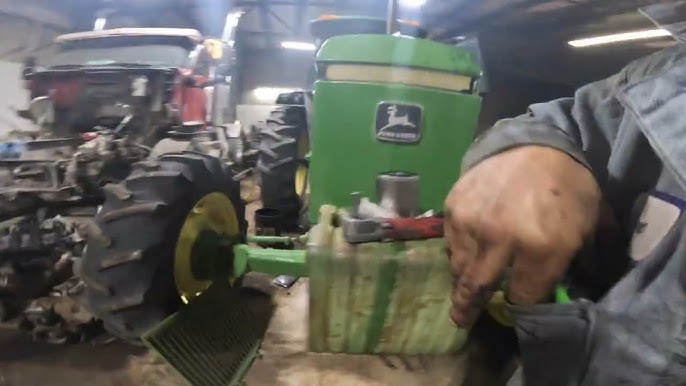John Deere 2950 is a popular tractor known for its reliability and strength. However, like any other tractor, it is prone to hydraulic problems that can affect its performance. In this article, we will discuss the common hydraulic problems in John Deere 2950 and how to solve them.
Common Hydraulic Problems in John Deere 2950
Hydraulic problems can manifest in various ways, affecting the overall performance of the tractor. Here are some common hydraulic issues that are often reported by John Deere 2950 owners:
| Hydraulic Problem | Symptoms |
|---|---|
| Low Hydraulic Fluid Level | Difficulty in lifting heavy loads, erratic movement of hydraulic attachments |
| Hydraulic Fluid Leaks | Puddles of hydraulic fluid under the tractor, decrease in hydraulic pressure |
| Unresponsive Hydraulics | Sluggish or unresponsive movement of hydraulic components |
| Contaminated Hydraulic Fluid | Discolored or cloudy hydraulic fluid, erratic hydraulic system behavior |
Solving Hydraulic Problems in John Deere 2950
Now that we have identified the common hydraulic problems, let’s explore how to solve them effectively:
1. Check And Refill Hydraulic Fluid
Low hydraulic fluid level is a common issue that can lead to poor hydraulic performance. To address this problem, check the hydraulic fluid level and refill it to the recommended level if necessary. It is important to use the right type of hydraulic fluid specified by John Deere for the 2950 model.
2. Inspect And Repair Hydraulic Fluid Leaks
Hydraulic fluid leaks can significantly impact the performance of the tractor’s hydraulic system. Inspect the hydraulic lines, hoses, and connections for any signs of leaks. If leaks are found, repair or replace the damaged components to prevent further hydraulic fluid loss.
3. Bleed The Hydraulic System
If the hydraulic system is unresponsive or sluggish, bleeding the system can help remove air pockets and restore proper hydraulic function. Follow the manufacturer’s instructions for bleeding the hydraulic system to ensure thorough and effective air removal.
4. Change The Hydraulic Filter
Contaminated hydraulic fluid can lead to erratic hydraulic system behavior. Regularly check and replace the hydraulic filter to prevent contaminants from affecting the hydraulic fluid and system performance. Proper maintenance of the hydraulic filter can help avoid costly repairs in the long run.
FAQ For John Deere 2950 Hydraulic Problems
What Are The Common Signs Of John Deere 2950 Hydraulic Problems?
Common signs include slow or jerky movements, unresponsive controls, and fluid leaks. Proper maintenance is crucial.
How Can I Troubleshoot Hydraulic Issues With My John Deere 2950?
Ensure adequate fluid levels, check for leaks, inspect filters, and consult the user manual for troubleshooting steps.
What Maintenance Practices Can Prevent Hydraulic Problems In The John Deere 2950?
Regularly check fluid levels, inspect for leaks, clean filters, and perform scheduled maintenance as per the manufacturer’s recommendations.
What Are The Potential Causes Of Hydraulic Fluid Leaks In A John Deere 2950?
Leaky hoses, damaged seals, or faulty connections can lead to hydraulic fluid leaks, impacting the system’s performance.
Why Is It Essential To Address Hydraulic Issues In The John Deere 2950 Promptly?
Delaying repairs can lead to further damage, costly repairs, and potential safety hazards, affecting the tractor’s overall functionality.
Conclusion
Hydraulic problems in John Deere 2950 can be frustrating, but with proper maintenance and timely intervention, these issues can be effectively addressed. Regular inspections, maintenance, and adherence to manufacturer guidelines for hydraulic system care are essential in ensuring the optimal performance and longevity of the tractor’s hydraulic system.
By addressing hydraulic problems promptly and effectively, John Deere 2950 owners can continue to rely on their tractors for various agricultural and industrial applications with confidence and peace of mind.
